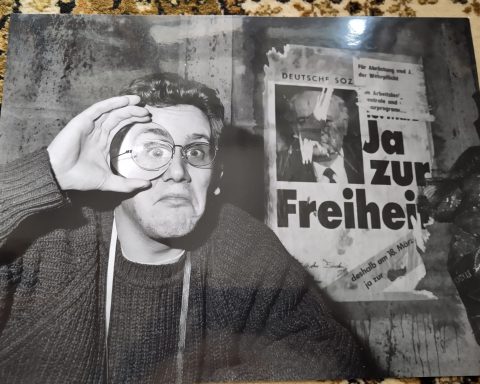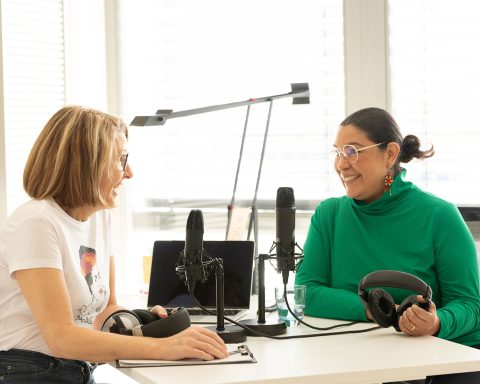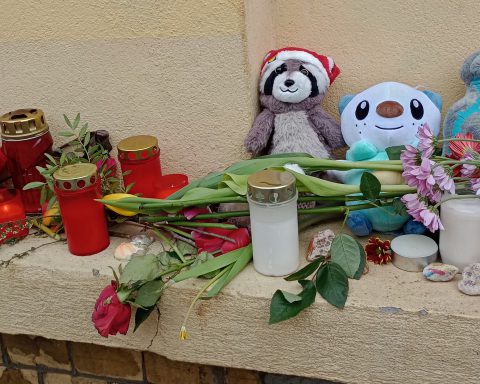- We’d gone over to try to interview the main Syrian refugee who had subdued the terrorism suspect.
- The Syrian community in Germany had spread the fugitive’s photo and info on social media, in an attempt to get him caught.
- Thankful for asylum in Germany after escaping ISIS, he said turning the suspect in to the police was an easy choice.
Update (11:14 p.m., 14 October): Afraid of extremists and no longer feeling safe in Leipzig, the three Syrian men who turned in the terrorism suspect have left the city for an undisclosed location in Germany. Police do not consider them suspects in the case. More info on Spiegel Online.
Update (11:44 p.m., 12 October): The Syrian terrorism suspect arrested in Leipzig has hanged himself in jail, after accusing the three Syrians who handed him over to police of being his accomplices. The credibility of this information is not confirmed. His allegedly planned attack on a Berlin airport could have happened within days, according to authorities. More info on ARD.
We pulled into the Paunsdorf block, with gray buildings and gray weather. It was quiet. There was nothing implying a terrorism suspect had been caught there the night before (9 October). No police cars around. No one looking nervous.
What we’d heard: The police were chasing a 22-year-old male in whose Chemnitz apartment they had found explosives. There had been unconfirmed reports that he wanted to attack an airport in Berlin. He had arrived at Leipzig train station and told a fellow Syrian that he didn’t have a place to stay for the night. The other Syrian took the man back to his place, and later tied him up with others’ help and called the police. And that’s how the police arrested the fugitive.

We’d gone over to try to interview the main Syrian refugee who had subdued the terrorism suspect.
There was a small group of people standing near the place of arrest in the Leipzig district – and that helped us pinpoint it exactly. Some journalists were in this group, but they looked like they could’ve been just passersby. We met one of the neighbors, a middle-aged man from Damascus who was talkative, friendly and helpful to us.
“I didn’t really know the guy,” he told us. “You can try to ring the doorbell over there, but he doesn’t want to show his face, you see? He’s from an area in Syria that is occupied by ISIS, and he’s afraid for his family’s lives. I do want to say though, that the Syrian community is ashamed of terrorists. These people are not Muslims.”
We gave it a try and rang the doorbell to the Syrians’ place. There was another reporter hovering in front of it, from Die Welt. She had driven all the way from Berlin, also to try to get an interview with the people who had overpowered and turned in the suspect. Later in her article, we read the refugees had heard of the fugitive via a “wanted” call on the Internet.
The Syrian community in Germany had spread the fugitive’s photo and info on social media, in an attempt to get him caught.
And it worked. But what will happen now to the main Syrian man and the two others who ultimately caught the terrorism suspect? Will they have to move, we wondered?
It must be quite scary, indeed, to be in this situation. ISIS for sure is not going to like it. Of course, this made international news. According to BBC, the suspect “probably” has links to the terrorist group.
The voice who answered the doorbell over the intercom was that of a friend of the main guy. He hesitated to let us in, saying the man didn’t want to talk anymore. He’d talked to other media already. After a bit of pleading on our side, the friend agreed to open the door. He buzzed us in, but the door was locked. He’d have to come down to open it. It was taking him a while.
Suddenly, an aggressive guy looking like he belonged to a right-wing group came over and pounded on the door to the building. There were others with him, but they didn’t look as aggressive. He rang several doorbells, and we were afraid he wanted to beat someone up. He flipped the neighbors off.
The role of the refugees and Syrian community in the terror suspect’s arrest earned praise from Saxony’s Prime Minister and a “thank you” from Angela Merkel herself, as well as some positive talk among the public. But, unsurprisingly, “there are fears of a backlash from the far right” and the fact that the AfD is going strong.
The men didn’t come down to open the door for us. Fearing a commotion, we called the police to go and check things out. There were more reporters in front of the door, holding a contract for the prospective interviewee to sign. They looked unfazed with the aggressive guy. We decided to leave, and soon realized the story had made the rounds.
We’d learn from the Welt reporter that he’d talked to Bild already. He’d given them a name and age – “Mohammed A., 36” – and even a picture of the fugitive tied up. LVZ published another name, though, “Ali.”
He’d told Bild that the terrorism suspect had offered money to set him free which, of course, he declined.
Thankful for asylum in Germany after escaping ISIS, he said turning the suspect in to the police was an easy choice.
Deutsche Welle called him and his friends “The Syrian heroes of Leipzig,” though they apparently only got to talk to the neighbor from Damascus.
Still, we want to talk to the man ourselves – and perhaps to other people who knew those involved in the story. We feel the story has weird and fragmented parts, and a lot of different information is being spread, making things a bit confusing. We’ll share with you what we come to learn, in future articles here.









